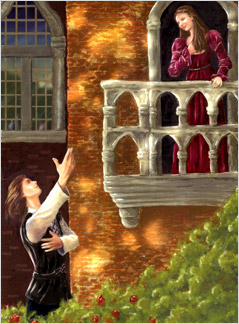Further into Romeo and Juliet
(Concluding last week’s piece on R & J)
 As we saw lat week on this page Romeo and Juliet is a tragic-comedy.
But to establish this aspect we must go further into the play. As we saw lat week on this page Romeo and Juliet is a tragic-comedy.
But to establish this aspect we must go further into the play.
As with Romeo, so with Juliet too there is always a transition from
the innocence of childhood to the curious mixture of modesty and
boldness of character- this mixture of innocence and frankness is
beautifully rendered later when Juliet is impatiently waiting for Romeo.
“Come night, come, Romeo, come thou day and night
|

Romeo and Juliet’s balcony scene |
O have bought the mansion of love,
But not possess if it, and though I am sold
Not yet enjoyed”
The parting scene is the climax of the love scenes and is one of the
greatest in the play where Shakespeare transform through his poetic
power what is a conventional situation in romantic literature into a
genuine and real one.
Greater maturity is indicated in the scenes which follow. If earlier
Juliet had grown from innocence and to boldness and has been awakened o
love, now the tragedy of her situation and her suffering fully transform
her to real maturity of courage. And the conversation between Juliet and
Paris in Friar Lawrence’s cell, Juliet is self assured and resourceful.
“Come you to make confession to this father
To answer that, I should confess to you
Do not deny t him that you love one
I will confer to you that I love him”
So too with Romeo. The emotional maturity of Romeo is suggested when
Romeo hers of Juliet’s death.
“Is it even so? Than I defy you star
Thou knowest my lodging: get me ink and paper
And hire post horse, I will hence tonight”
There is no lamentation. It is a simple decision.
And later desperateness of his situation gives a keen edge to what
Romeo tells the apothecary. In far there is a greater awareness:
“But then so bare ad full of wretchedness”
“Then be not poor, but break it and take this”
There remains to be considered the form of the play. After all Romeo
and Juliet is a tragedy.
Romantic comedy is a convenient description because it helps to focus
our attention on the love thee and the form of the play-it’s tragic
form. It is customary to describe it as tragedy of fate. Support for
this view is derived from the prologue to the play – the reference to
the star-crossed lovers. This reading of the play as one of irresistible
destiny or fate warring against the lovers is not true.
The play is really about two young lovers whose love is frustrated by
their parents’ strife and a variety of other circumstances quite natural
and plausible. We have to consider the ending of the play too.
The view is sometimes held that the play could have had happy ending.
But for that unforeseen incident at the end of the play when the
messenger from Friar Lawrence is prevented from communicating with Romeo
everything would have ended happily.
A simple answer to that is that the blundering of the messenger is
not the only circumstance that contributes to the tragedy.
There is the impetuosity and insolence of Tybalt which precipitates
the real crisis in the love of Romeo and Juliet, there is the anxiety of
the Couplets to Juliet well married and using the death of Tybalt to
hasten the marriage.
The real answer to those who say that the play could have had happy
ending is that the play could not have ended otherwise for more valid
reasons.
The tragic outcome is in the poetry of the play itself. It is the
poetry that from the beginning prepares us for the tragic end.
The premonitions of the catastrophic end are there in the poetry from
the beginning. Romeo is filled with forebodings as he enters the house
of Capulets.
“I fear two early, for my mind misgives…By some vile forfeit of
untimely death.”
Juliet as she sees Romeo descending from her chamber exclaims:
“God, I have an ill -driving soul’ …’Enter my eyesight fails or those
lookst pale”
The imagery of the play – the contrast between light and darkness
also anticipate the tragic ending. The vision of defeated love transmits
itself unconsciously to as through the repeated contrast between light
and darkness.
Besides the poetry, the chief characters are so presented tht the
tragedy is made to appear inevitable.
The impatience of the lovers has to be answered by the brevity of
their love and the solemn figure of the Friar points to the same
conclusion.
The tragic outcome appears inevitable when we consider the
concentrated force of the organization. Speed is the very essence of the
play. Everything takes place so swiftly.
No sooner Romeo and Juliet felt the impact of love than the flow
falls with the death of Tybalt. Then it is one of swift downward rush to
the inevitable tragedy.
If the tragedy is in poetry, in the forebodings of gloom that hangs
about the play, and the rapidity of the action, it is futile to discuss
whether the tragedy is a tragedy of fate.
And in the total scheme of t he play, in the total organization of
characters, incidents and poetry, the accidental circumstance of the
messenger all appear natural and plausible.
(I am indebted to my innovative teacher at St Joseph’s College,
Colombo in my University Entrance form, the late M I Kuruvila, for
guiding me to understand this Shakespearean play in the late 1950s.)
[email protected] |





